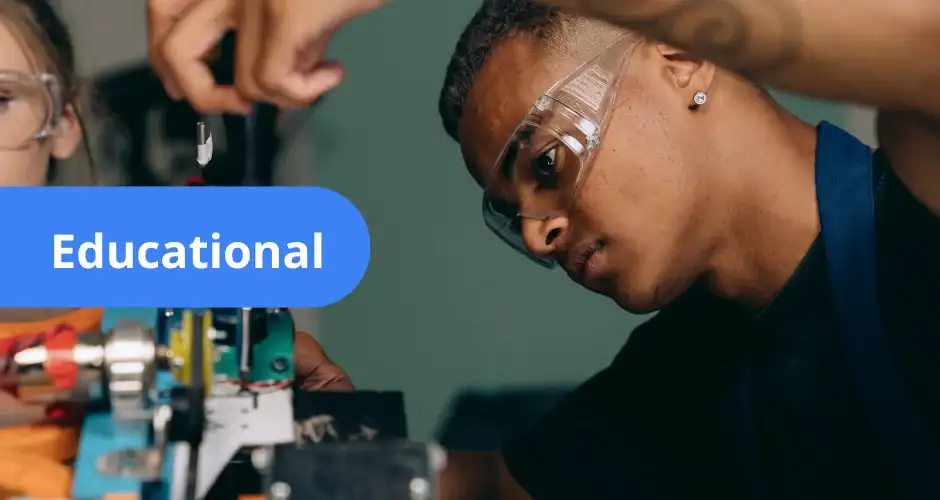GUEST POST
What Are T-Level Qualifications?

T-level qualifications (the T stands for Technical) were introduced in 2020 to meet the growing demand for highly skilled technical professionals. They are vocational education qualifications which combine classroom learning with an industry placement.
What Exactly Are T-Levels?

T-levels are a new vocational education qualification that provides an alternative to the existing Level 3 qualifications. T-Levels are two-year courses for 16 to 19-year-olds, and are equivalent to three A-Levels.
They have been developed in collaboration with employers to produce career-focused courses that ensure students gain the knowledge, skills, and behaviours that are required by industry, and have a substantial industry placement.
There are many different T-Level qualifications, each tailored to a specific career sector. Current T-Level qualifications being offered include Digital, Health, Construction, Education and Early Years, Engineering, Manufacturing, Legal Services and many more.
Why Were T-Levels Introduced?
In 2016, a review of education highlighted the need for improvements to the vocational education routes that were offered to 16 - 19 year olds. The review highlighted significant skills gaps, with employers reporting that they struggled to find young people with the practical expertise required for various industries.
Supplementary study with a GCSE tutor in core subjects like Maths or English can help students meet entry requirements for T-Levels. T-level qualifications were introduced to meet the growing need for more career-focused courses. The aim of T-levels is to:
- Improve Technical Education: By improving the quality of vocational education, the government aims to make these courses a viable alternative route to university or the workplace.
- Better Meet Employers' Needs: The T-levels are designed with employers to ensure the curriculum is relevant and provides students with the most in-demand skills.
- Enhance Employability: by teaching students the skills they need, this should improve their employability and progression.
What Makes T-levels Different From Other Courses?

Traditional A-level courses are 100% classroom-based. With T-Levels, approximately 80% of the programme is spent in the classroom, allowing time to focus on theoretical knowledge and core skills; the remaining 20% is spent learning skills on an industry placement. Students often combine this with online tuition to reinforce subject knowledge that will help them react and reflect on their practical work.
This makes T-levels much more career-focused as students are developing relevant skills and attributes. Every T-Level student must complete a minimum of 315 hours (approximately 45 days) with an employer.
How Are T-levels Assessed?
The assessments are broken down into two parts:
1. The Technical Qualification (TQ)
This is where the classroom-based aspect of the course is assessed. It’s divided into two parts:
Core Component: This is assessed at the end of the first year of the course through external exams, which cover knowledge, understanding, and core skills. There is also a further exam called an employer-set project - for example, in T-level Health, students are given various role plays and have to demonstrate they can elicit information from patients and recommend suitable care options for them. The role plays are recorded and then graded by the exam board. The core component is graded from A* to E.
Occupational Specialism(s): The occupational specialism is assessed at the end of the second year. This focuses on developing specific knowledge, skills, and behaviours required for a particular job role within the sector, e.g. in Health there is the option to specialise in areas like midwifery, adult nursing, therapy and mental health. Assessment for the occupational specialism is typically through externally set project-style assessments, graded Pass, Merit, or Distinction.
2. The Industry Placement:
Every T-Level student must complete a minimum of 315 hours (approximately 45 days) with an employer. This is a big increase from the older BTEC vocational courses, where only 100 placement hours were required. As employers are invested in the training, this can often lead to jobs or further apprenticeships being offered at the end of the course. The industry placements are designed to allow students to:
- Apply learning to real-life situations: this allows students to put their classroom knowledge and skills into practice in a real workplace environment. For example, on T-level Health, students are often placed on real hospital wards and learn to take blood pressure, insert catheters, take blood samples etc.
- Develop practical skills: working in industry allows students to gain practical experience with up-to-date equipment relevant to their chosen industry.
- Build Professional Behaviours: work placements allow students to develop essential soft skills such as teamwork, communication, problem-solving, and professional conduct.
What Qualifications Do I Need To Do T-levels?
The qualifications needed will vary slightly between providers and may depend on the exact course you want to do. Most providers ask for a minimum of five Grade 5s at GCSE to include Maths and English. Working with a specialist GCSE tutor can help students secure the grades they need.
Students who haven’t quite achieved these grades may be eligible for the T-level Transition Programme which is a one year, Level 2 course which provides an alternative route to T-levels.
What Can I Do With A T-Level?

T-levels have been designed to offer a variety of progression pathways once you have finished your course. As they are career-focused courses, they could lead straight to employment as students with T-levels have a strong blend of theoretical knowledge and practical experience, which makes them highly attractive to employers.
T-level qualifications also provide an excellent foundation for going on to higher or degree apprenticeships. This provides an alternative route to a degree where you are paid a salary while learning on the job.
For those wanting to go to university, T-levels carry UCAS points and are recognised by universities. The UCAS tariff for T-Levels aligns with A-Levels, with a Distinction* T-Level being equivalent to three A*s at A-Level (168 UCAS points). Students aiming for top results may also benefit from additional support, such as online tuition, to strengthen academic skills alongside their T-Level studies.
Which Is the Right Level 3 Choice for Me?
The right choice will depend on your chosen career path. If you have a clear career in mind, then T-level qualifications will help you focus on gaining the skills required for that career, while still retaining a large theoretical component.
T-Levels vs. A-Levels: A-Levels focus on subjects rather than specific careers, whereas T-Levels are vocational and career-focused courses. Both are accepted by universities, but T-Levels are ideal for students who have a clear career path in mind and prefer to learn the skills aligned with that career.
Where Can I Find Out More?
The uk.gov website offers a more detailed overview of T-levels
Or alternatively, contact your local FE college for more information on which T-level qualifications they provide and to find out when their open days are.
Parents
Students

Vicki J
Tutor
An experienced teacher and GCSE Principal Examiner in Science
Looking for a tutor?
Sherpa has hundreds of qualified and experienced UK tutors who are ready to help you achieve your goals. Search through our tutors and arrange a free 20 minute introduction through our industry-leading online classroom.
Find a TutorSimilar Articles



